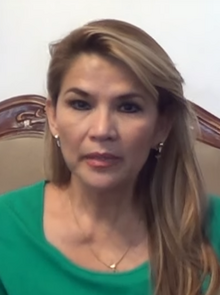Jeanine Áñez
This article is about a person involved in a current event. Information may change rapidly as the event progresses, and initial news reports may be unreliable. The last updates to this article may not reflect the most current information. |
Jeanine Áñez | |
|---|---|
 | |
| President of Bolivia | |
| Assumed office November 2019 | |
| Preceded by | Evo Morales |
| Senator for Beni | |
| In office 22 January 2010 – 11 November 2019 | |
| Personal details | |
| Born | Jeanine Áñez Chávez 13 August 1967 Trinidad, Bolivia |
| Political party | Democrat Social Movement |
Jeanine Áñez Chávez[1] (Spanish pronunciation: [ɟʝaˈnine ˈaɲes]; born 13 August 1967)[2] is a Bolivian politician and lawyer, who declared herself President of Bolivia after the resignation of the government of Evo Morales. She was previously a Senator from Beni. Her politics have been described as fiercely anti-Evo Morales, who was her immediate predecessor as President of Bolivia.[3][4]
Education
Áñez has a graduate degree in law and legal sciences.[3]
Career
Áñez passed the bar in 1991.[3] She was formerly a media director at Totalvision.[2]
Constituent Assembly (2006–2008)
Between 2006 and 2008, she served as a constituent assemblywoman for the drafting of the new constitutional charter. She was a member of the Constituent Assembly for the commission of organization and structure of the country, also working as part of the Judiciary.[3]
Senate (2010–2019)
In 2010, she was elected as senator as a member of the party Plan Progress for Bolivia-National Convergence (P.P.B - C.N), representing the Department of Beni in the National Assembly.[3][5] By 2019, she was the Second Vice President of the Senate, and her alternate was Franklin Valdivia Leigue.[2] This role placed her fifth in the line of succession to the presidency.[3]
President of Bolivia (2019–present)
Following the resignation of the government of Evo Morales on 10 November 2019, she became the highest-ranking official in the line of succession to the presidency of Bolivia, and assumed the presidency on 11 November 2019 after convening the Senate to formally accept the resignations of the previous day.[6] Áñez became the President of Bolivia on 12 November 2019 following the resignation of President Evo Morales and other sudden government resignations on 10 November 2019[7] Due to the military's involvement in the resignations, the events have been called a coup d'état by several critics.[7]
She said that her first hope was to achieve a quorum after the many resignations, and then to call new elections.[3] Áñez could not hold an emergency assembly until the day after Morales' resignation, as she was in Beni and there were no Sunday flights from there to the capital of La Paz.[3]
On 11 November, Añez arrived at La Paz-El Alto airport and was taken in a military helicopter to a nearby Air Force base. From here, she traveled to the Bolivian Senate. There she stated that a session of the body would be convened on 12 November 2019 to formally accept Morales' resignation.
Personal life
She is married to Héctor Hernando Hincapié Carvajal, a Colombian politician.[3]
References
- ^ Entrevista Jeanine Añez Chavez, retrieved 11 November 2019
- ^ a b c "Jeanine Áñez Chávez". Cámara de Senadores (in Spanish). 16 October 2015. Retrieved 11 November 2019.
- ^ a b c d e f g h i "Bolivia: quién es Jeanine Añez Chávez, la mujer que puede quedar al mando de la transición" [Bolivia: who is Jeanine Añez Chávez, the woman who can be in charge of the transition]. El Cronista. 11 November 2019. Retrieved 11 November 2019.
{{cite web}}: CS1 maint: url-status (link) - ^ Faiola, Anthony. "After Morales' resignation, a question for Bolivia: Was this the democratic will, or a coup?". Washington Post. Retrieved 11 November 2019.
{{cite web}}: CS1 maint: url-status (link) - ^ "Jeanine Añez Chávez" (in Spanish). vicepresidencia.gob.bo. Retrieved 21 April 2014.
- ^ BBC News Mundo (ed.). "Jeanine Añez en proceso de ratificación tras renuncia del Presidente, Vicepresidente, Presidente del Senado y Presidente de la Cámara de Diputados de Bolivia". Retrieved 10 November 2019.
- ^ a b "Après la démission d'Evo Morales, les insoumis dénoncent un "coup d'État"". Le Huffington Post. 11 November 2019.

